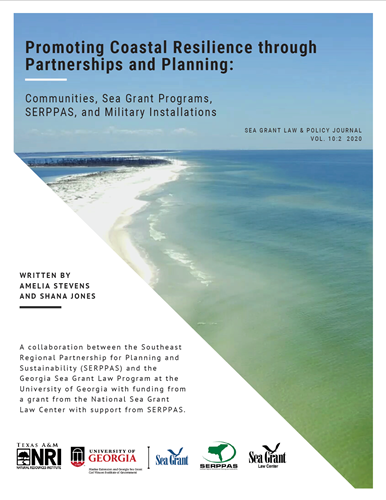

Promoting Coastal Resilience Through Partnerships and Planning
February 9, 2021
Written by: Addie Thornton and Shana Jones
What some might see as an unlikely partnership at first, has blossomed into an action-oriented, trail-blazing group of partners working collaboratively towards a common goal: building coastal resilience in the Southeast region. SERPPAS, a regional partnership chaired by the U.S. Department of Defense (DoD) and a rotating State Agency covering North Carolina, South Carolina, Georgia, Florida, Alabama and Mississippi, crossed paths with the Georgia Sea Grant Law Program at the University of Georgia and saw an opportunity. At the time we were not aware of any DoD entities (installations or programs) that were engaging directly with the Sea Grant network, a NOAA-funded network of 34 university-based programs that support coastal and Great Lakes communities through research, extension and education.
With similar and overlapping goals to help installations and communities on the coast be more resilient in the face of hurricanes, sea-level rise, flooding and more, SERPPAS and the Georgia GA Sea Grant Law Program hosted a meeting in August 2019 titled “Collaborating Towards Coastal Resilience in the Southeast,” with the overall goal to understand challenges and explore opportunities to collaborate on coastal resilience to benefit military readiness and the surrounding communities. The meeting was also designed to build a critical link among Sea Grant programs, military installations, and the regional natural resources leaders in the Southeast. Throughout the meeting this was achieved by increases our understanding on:
- SERPPAS goals and needs for military readiness on the coast;
- State and local laws and policies influencing coastal-decision making;
- Innovative engineering options that incorporate natural systems.
We believe we achieved this goal, as at the end of the meeting, we had identified specific pilot projects to pursue across the Southeast region that enhance resilience for the benefit of military readiness and surrounding communities as well as identified next steps for further partnership and communication among this group of partners to ensure on-going collaboration.
The article written to capture the outcomes of the meeting, "Promoting Coastal Resilience Through Partnerships and Planning: Communities, Sea Grant Programs, SERPPAS, and Military Installations" demonstrates part of this achievement by outlining the enormous learnings that happened across the different sectors of participating agencies, organizations and experts. The various tools, resources and expertise that both the military and the Sea Grant Network bring to the coastal resilience table are explored and described in this article. We are very grateful to the funders of the workshop, both the National Sea Grant Law Program and SERPPAS, author Amelia Stevens (Georgia Sea Grant Law Fellow), as well as to the Texas A&M Natural Resources Institute for turning this law article into a work of art! We hope to share this widely among stakeholders and partners in the Southeast to continue to explore these opportunities.
This article and workshop marked the beginning of a partnership that is still going strong between SERPPAS and the Georgia Sea Grant Program which continues to collaborate on projects and strategies to increase coastal resilience in the Southeast region.
Read the article here:
Learn More
Department of Defense Natural Resources Program
Supporting access to well-managed DOD lands, waters, and airspace by safeguarding natural ecosystems critical to the military mission








